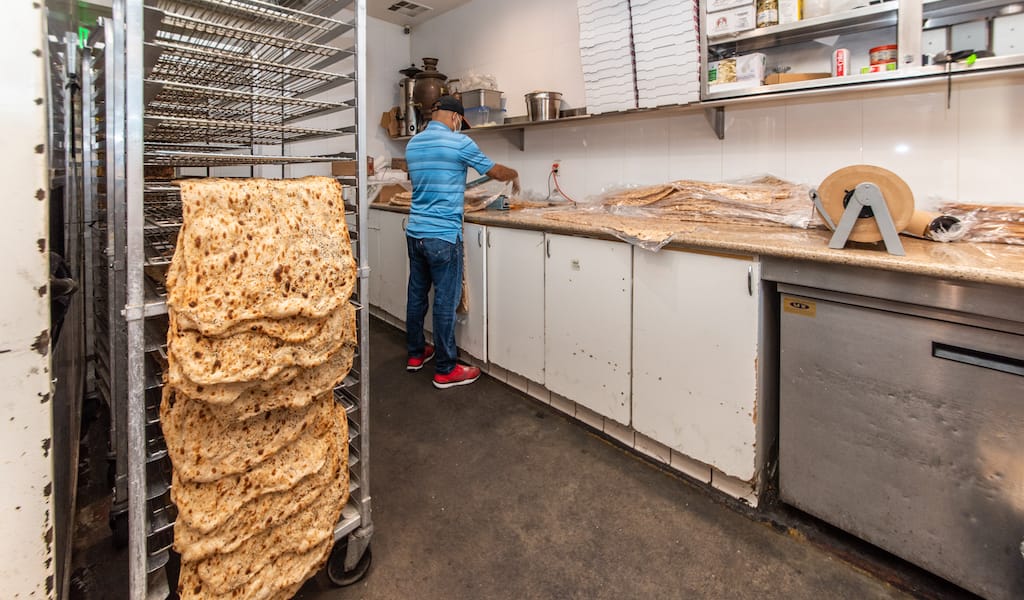Every year, for one month only, bakeries across Istanbul churn out round, flat, yeasty loaves of Ramazan pidesi, a Turkish flatbread. Before Muslims break their fast at sundown, they hurry to buy these addictively chewy pides, which are essential to the iftar meal here. Some bakeries rely on machines to shape the pide and stamp the traditional checkerboard pattern on top; others do it the old-fashioned way, by hand in wood-fired ovens.
Tophane Tarihi Taş Fırın is a third-generation, family-run bakery that is known for its simit, the sesame-crusted bagel sold on every corner in Istanbul. They also make excellent Ramazan pidesi in their 130-year-old wood oven. Two easygoing Eryılmaz brothers run the shop, while additional family members head up many other bakeries in the area. The pide-making process comes easily because they’ve been working in their dad’s bakery since they were 13 years old.
Upstairs, an usta (master) mixes the dough at 4:30 in the afternoon: one huge sack of Edirne flour, yeast, cold water and salt. After a short rise, the dough is divided into balls, then left to proof on sheet trays lined with whole-wheat flour. They pass the sheet pan through a slit in the floor to the ustas downstairs. In front of the hot oven, the usta casually glazes the proofed dough rounds with yogurt and egg yolks, then presses the edge of his palms in a crosshatch pattern to flatten the dough and finally sprinkles nigella seeds on top. The next usta eases the soft pide from a 10-foot-long wood paddle into the giant oven for seven to 10 minutes. The wood paddle is so long that they cut a hole in the front window for the end to stick out – unaware pedestrians might find themselves in a surprise jousting match. Another worker brushes the excess whole-wheat flour from the bottom of each pide before stacking them on a display table.
The first customer is the owner of Osmanlı Mutfağı restaurant in nearby Karaköy. He comes here every day during Ramadan to pick up a few bags of pide because “[his customers] prefer it to regular bread for iftar.” Next up is a woman who is particular about the topping – she’s after only eggs, not yogurt. A girl comes in but doesn’t have small change. She leaves with a hot pide and a promise to come back tomorrow with her coins.
This is truly a neighborhood bakery, where people come for traditional Ramazan pidesi, made dutifully to their standards by dedicated ustas. The brothers say they don’t make a profit on Ramazan pidesi, but rather do it “to be friends with the neighbors.”
This article was originally published on July 21, 2014.
 April 27, 2021 Fast Times
April 27, 2021 Fast Times
The holy month of Ramadan has arrived, and along with it Istanbul has been blessed with […] Posted in Istanbul May 12, 2020 Yearly Bread
May 12, 2020 Yearly Bread
It wouldn’t be an understatement to say that Turkey remains starkly divided on a range […] Posted in Istanbul July 25, 2022 Naan Hut
July 25, 2022 Naan Hut
Even as traffic slithers to a crawl west of the 405 Freeway on Santa Monica Boulevard, […] Posted in Los Angeles
Published on April 19, 2021
Related stories
April 27, 2021
IstanbulThe holy month of Ramadan has arrived, and along with it Istanbul has been blessed with beautiful spring weather. Normally, people throughout the city would be gathering in groups large and small in the evening to enjoy their fast-breaking iftar, but these days are anything but normal. Surging Covid-19 figures, which recently eclipsed 60,000 a…
May 12, 2020
IstanbulIt wouldn’t be an understatement to say that Turkey remains starkly divided on a range of issues, be it the controversial 2017 presidential system referendum or whether the classic scrambled egg dish menemen, which is always made with chopped green peppers and tomatoes, should also be prepared with onions. While the referendum squeaked through with…
July 25, 2022
Los Angeles | By Hadley Tomicki
Los AngelesEven as traffic slithers to a crawl west of the 405 Freeway on Santa Monica Boulevard, drivers may be hard-pressed to notice the small storefront known as Naan Hut standing on their periphery. Neither its name nor its red-and-yellow signage offer any indication that a 1,000-year-old Persian tradition of baking naan sangak is upheld within…

















































































